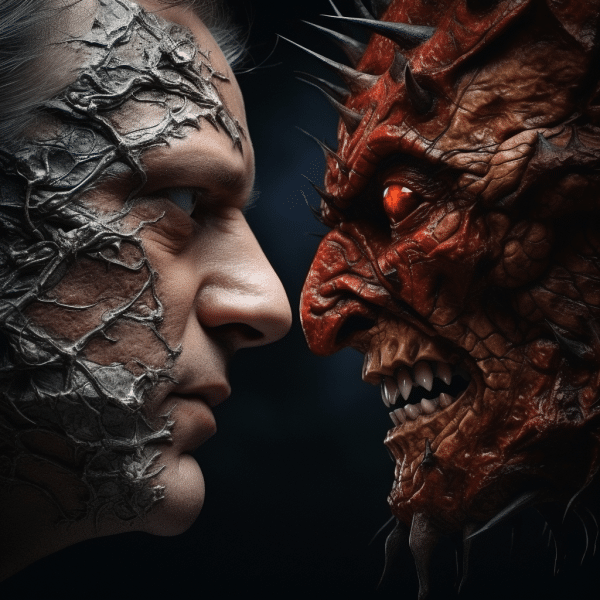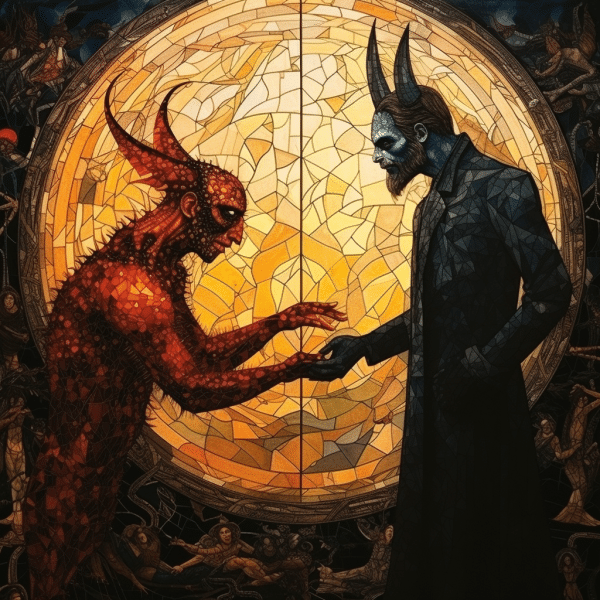

God and the devil’s relationship, God and the devil have an intriguing relationship. They are not just good versus evil, but linked in ways deeper than that. By examining their connection, we understand more about people and the world.
Different religions and myths portray these two differently. In Christianity, God is goodness, and the devil is sin. However, some cultures think of them as parts of the same thing, each essential and balancing the other.
The relationship between God and the devil reflects our own internal battles. The devil tempts us, leads to bad deeds and darkness. God stands for cleanliness, morality, and light. This mirrors our own struggle between our desires and conscience.
An old folktale can help explain this. Gilgamesh, in ancient Mesopotamia, goes looking for eternal life. He discovers, though, that death is a part of living. Through his experiences with gods and demons, he learns about mortality and how to face life’s difficulties.
This story shows that God and the devil are not enemies, but pieces of a bigger picture. Their relationship highlights the complexity of being human – a balance of good and bad, dark and light.
Exploring Different Perspectives
To gain a comprehensive understanding of the relationship between God and the devil, explore different perspectives. Delve into the religious, philosophical, and literary viewpoints. Discover how these perspectives offer unique insights and interpretations, shedding light on the complex and nuanced dynamics between these two entities.
The Religious Perspective
Religion pervades the lives of millions worldwide. It offers a structure to comprehend purpose and relationship with the divine. Solace, comfort, and guidance come from rituals, prayer, and meditation. It also outlines ethical values and moral behavior based on divine teachings or sacred texts. Acting as a compass, it guides laws, customs, and social norms. Throughout history, religious perspectives profoundly impacted cultural practices, art, architecture, literature, and music. For instance, Greek mythology had a remarkable influence on culture and art. Homer’s “Iliad” and “Odyssey” were born of religious tales.
The Philosophical Perspective
The philosophical perspective dives deep. It lets us explore the complexities of human thought and experience. We examine abstract concepts like truth, morality, and consciousness.
Philosophy encourages critical thinking and rationality. We question assumptions and seek explanations. We use logical reasoning to uncover underlying truths.
Metaphysics is a branch of philosophy. It investigates the nature of reality. Questions like being, identity, existence, and causality are explored. We contemplate concepts beyond our experience.
Ethics is another part of this perspective. We ponder ethical theories like consequentialism, deontology, and virtue ethics. This helps us make ethical decisions that promote well-being.
To embrace the philosophical perspective: we have conversations with those with differing views. Read classic philosophical texts to understand different schools of thought. Introspection and meditation foster self-awareness. This leads to a more enriched philosophical perspective.
The Literary Perspective
Uncover the intricate narratives crafted by authors with The Literary Perspective! Delve into symbolism to unveil hidden messages and deepen your understanding of characters and themes. Appreciate the art of character development, as authors bring their fictional creations to life through vivid personalities and traits. Explore the underlying ideas and concepts that form the foundation of literary works, providing thought-provoking insight into various topics.
Plus, appreciate language as an art form! Examine literary techniques, such as metaphor, simile, and imagery, to see how authors skillfully manipulate words to create vivid imagery.
Take a journey with The Literary Perspective and discover the power of storytelling! Rejuvenate your appreciation for literature, as it entertains, educates, and inspires individuals. Start your exploration today!
Historical Perspectives on the Relationship between God and the Devil
To gain a deep understanding of the historical perspectives on the relationship between God and the devil, explore religious texts and interpretations, as well as cultural and mythological beliefs. These sub-sections provide varied insights into the complex dynamics between these paramount entities.
Religious texts and interpretations
The Bible, Quran, and other religious texts have impacted our understanding of God and the Devil. Different interpretations of these texts have led to varied beliefs about their relationship. Some conceive them as adversaries in a cosmic fight, while others see the Devil as subservient to God. Varied religious traditions offer distinct insights, inspiring diverse beliefs around the world. Scholars use historical, sociological and theological lenses to gain deeper insight into the texts’ meanings.
An example of this is the Book of Job in the Hebrew Bible, where God lets Satan test Job’s faithfulness. This challenges the traditional idea of an absolute contrast between God and the Devil. In medieval Europe, tales of demonic possessions caused terror of spiritual warfare. The Loudun Possessions case in 17th-century France, involving Ursuline nuns supposedly possessed by demons, shows society’s interest in the complex dynamic between God and the Devil.
Cultural and mythological beliefs
Cultures all over the planet have expressed their ideas about God and the Devil through myths and legends. These stories are a mirror to society’s beliefs and give moral instructions. Examples are Zeus, a Greek god embodying power, and Hades, a character symbolizing darkness and evil.
Cultural ideas often explore the fight between these forces. This battle is shown in different forms, such as the Norse myth of Ragnarok or Lucifer’s fall from grace in the Bible. Through these tales, people attempt to explain the presence of both good and bad in the world.
Moreover, religious practices shape cultural views of God and the Devil. Traditions from all religions reveal their understanding of these entities’ part in life. From exorcisms to prayers for protection from malevolent forces, these customs demonstrate a lasting belief in both divine and diabolical powers.
This overview only touches the surface of the vast range of cultural and mythological ideas about God and the Devil. By exploring narratives from societies throughout history, we get a fuller comprehension of humanity’s struggles with this fundamental duality.
Curious to learn more? Uncover a tapestry of stories that show our fascination with God and the Devil by digging into cultural beliefs worldwide. Don’t miss out on finding more captivating insights into this amazing topic!
Debates and Controversies
To gain insights into the relationship between God and the devil, dive into the lively realm of debates and controversies. Discover the Theodicy, unraveling the Problem of Evil. Delve into the complex dynamics of Free Will vs. Divine Control. Lastly, explore the intriguing Role of the Devil in Human Suffering.
Theodicy: The Problem of Evil
Theodicy – an effort to reconcile the presence of evil and suffering with an all-powerful, loving God – has provoked heated debate among scholars and individuals. How can God permit such pain and anguish?
Religious traditions have come up with various explanations. One supposes that evil and suffering are the result of free will – the capacity for humans to make decisions – even if it brings negative outcomes.
Another viewpoint says evil is part of a greater, divine purpose. It claims suffering could be a catalyst for personal growth, moral advancement, and faith.God and the devil’s relationship, From this angle, God’s plan may be too complex for humans to understand, containing both pleasure and sorrow.
Some also believe our idea of evil is restricted by our finite understanding. What appears wrong to us might have a deeper, cosmic importance. This emphasizes that we should be humble in recognizing our incapacity to comprehend God’s intentions.
These answers provide no certainties. Instead, they show how diverse thinkers have addressed this complicated problem over time. Ultimately, each person must explore these questions in their own way, finding comfort and comprehension within their beliefs.
Joseph A. Bracken, in his book “Does God Roll Dice?: Divine Providence for a World in Process,” notes that the issue of evil is still a prominent topic of contemplation in many intellectual circles.
Free Will vs. Divine Control
The debate between free will and divine control has been a source of puzzlement for scholars and theologians alike. God and the devil’s relationship, Is human agency really independent or does it abide by a divine power’s preordained plans?
Let’s take a look at the differences between these two concepts to clarify the philosophical quandary.
Free Will: Human autonomy, individual choices, limited outside influence.
Divine Control: Pre-determined destiny, divine intervention, all-encompassing power.
Getting into more detail, we find that free will does give humans the ability to make decisions without external influence; however, these decisions may be affected by external factors.
The idea of predestination is integral to divine control, which suggests that our destiny has already been determined by a higher power, leaving little room for personal autonomy.
Various philosophical and theological schools have taken contrasting stances on this issue. Some champion free will as a core human attribute, while others suggest that all events are subject to divine intervention.
Neuroscientists have also studied the connection between free will and decision-making, attempting to understand the brain’s role in the process. Research suggests that our choices may be impacted by subconscious bias and external triggers, calling into question the concept of complete autonomy.
The Role of the Devil in Human Suffering
Human suffering is an age-old problem. Debates have risen over the Devil’s role in it. Some religions say he causes it. They believe he tempts people towards sin, causing them to suffer.
Not all religious and spiritual traditions have the same view. God and the devil’s relationship, Some see suffering as a result of karma, fate, personal choices, or free will.
In Islam, Satan can lead people wrong, but it is up to them to resist him. The Quran states each person is only given what they can bear. So, they are responsible for their actions.
Buddhism says suffering is part of life. It encourages people to go beyond suffering with enlightenment. So, they don’t blame it on the Devil.
Different cultures and religions have different views of supernatural entities like the Devil and how they affect suffering. Symbolic or metaphorical concepts can be used to understand this.
God and the devil’s relationship, Psychological studies have looked at how beliefs about supernatural entities affect people’s perception of suffering and how they cope. Dr. Jocelyn Bellamy from Stanford University found those who believe in the Devil as malevolent are less likely to take responsibility.
Examining Different Views on the Relationship
To understand the relationship between God and the devil, examine different views on the subject. Dualistic views pit God against the devil, while non-dualistic views emphasize unity and harmony. Dualistic views: God vs. Devil. Non-dualistic views: Unity and Harmony.
Dualistic Views: God vs. Devil
Philosophy and religion often grapple with the relationship between God and the Devil. Let us explore this topic further!
See the table below for contrasting perspectives:
| Perspective | God | Devil |
|---|---|---|
| Divine Goodness | Embodies benevolence, love, and compassion | Seen as the embodiment of evil and malevolence |
| Dualism | Manifests as opposing forces | Stands in stark contrast to all that is good |
| Religious Faith | Revered as the ultimate source of salvation | Considered as a tempter and deceiver |
God is usually seen as benevolent and loving, while the Devil is viewed as an adversary. This illustrates the eternal struggle between good and evil.
Certain religious beliefs embrace dualism, where God represents virtue and the Devil stands for wickedness. This framework helps believers make moral decisions.
Clearly, these divergent perspectives have greatly impacted humanity .God and the devil’s relationship, They continue to shape our beliefs on morality and spirituality.
Non-Dualistic Views: Unity and Harmony
Non-Dualistic Views emphasize the oneness of existence. They reject duality and point to the interconnectedness of all things. This perspective sees separations as an illusion. Instead of perceiving opposites, these thinkers look for the unity in diverse experiences.
By embracing this outlook, individuals can view relationships differently. Non-Dualistic Views don’t ignore conflicts, but rather seek common ground and harmony. This promotes understanding, compassion, and empathy among people.
Furthermore, Non-duality celebrates diversity as an integral part of unity. It encourages dialogue and collaboration based on mutual respect.
To embrace Non-Dualistic Views, one should adopt a curious mindset. By suspending judgment and truly listening to others, we can create meaningful connections based on empathy and shared humanity. Through this practice, we foster unity and harmony in our relationships.
Conclusion: Varying Interpretations and the Importance of Individual Beliefs.
Interpretations of God and the devil can vary greatly, due to the complexities of religious teachings. Some see them as opposites in a battle of good and evil. God and the devil’s relationship, Others think the devil serves as a spiritual test.
One view is that free will lets us choose between right and wrong. The devil represents the temptations that try to disconnect us from God. It’s important to use our free will wisely, to stay connected with God and avoid the devil’s influence.
Another viewpoint is that God and the devil are not opposed, but part of a balanced system. Darkness and light, good and evil, both have their place. This helps us grow spiritually and experience life.
When talking about God and the devil, it is important to be open-minded and respectful. Shared values of love, compassion, and empathy can create meaningful conversations. Listening actively to different perspectives can create a place of harmony.
Each individual must come to their own understanding. Through introspection and exploration, we can find peace and a connection with the divine. By respecting diverse interpretations, we can create an inclusive community that honors human spirituality.
Frequently Asked Questions
Q: What is the relationship between God and the devil?
A: The relationship between God and the devil is often understood as that of absolute opposites. God is considered the all-powerful and benevolent creator of the universe, while the devil (also known as Satan) is seen as a fallen angel who rebelled against God and represents evil and temptation.
Q: Does God control the devil?
A: In many religious beliefs, God is considered to have ultimate control over everything, including the devil. However, the exact nature of this control is open to interpretation and may vary between different religious traditions.
Q: Why does God allow the devil to exist?
A: God and the devil’s relationship, The allowance of the existence of the devil is a challenging theological question. Some theories propose that the presence of evil, represented by the devil, serves a greater purpose, such as testing human beings’ faith and allowing them to exercise free will.
Q: Can the devil be redeemed?
A: The concept of redemption for the devil differs across various religious beliefs. Some religions believe that the devil’s rebellion against God is an everlasting choice, and therefore, there is no possibility of redemption. Others suggest that God’s forgiveness extends to all beings, including the devil, and redemption is theoretically possible.
Q: Is the devil equal in power to God?
A: In most religious teachings, the devil is seen as a created being and thus inferior to God in power and authority. While the devil may possess considerable influence, God’s omnipotence and supreme authority are believed to surpass any power the devil may hold.
Q: Does everyone have a personal encounter with the devil?
A: Beliefs regarding personal encounters with the devil vary among different religious and spiritual traditions. Some individuals may claim to have experienced direct contact or temptation from the devil, while others interpret such encounters as metaphorical representations of evil influences or internal struggles.








